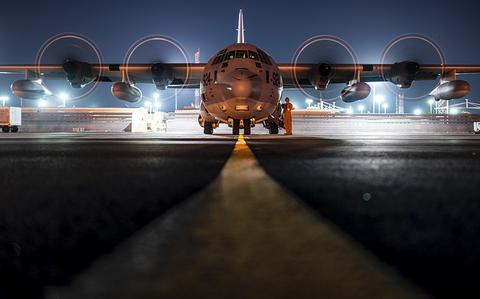A U.S. Marine Corps KC-130J Super Hercules prepares for takeoff at Camp Lemonnier, Djibouti, on May 2, 2023. (Joseph LeVeille/U.S. Air Force)
If the United States is not careful, it is destined to make the same mistake with Djibouti as it did in the early 1990s with the Philippines. The breakdown between the George H.W. Bush and Corazon Aquino governments resulted in the removal of all U.S. military presence from a nation of strategic American importance. As the threat from China is ever increasing, the Philippine government now welcomes the return of U.S. forces. Fortunately, China was never able to fully exploit the 30-year breakdown in the Pacific. Ongoing activities in Djibouti confirm China does not intend to have another lost opportunity.
Located on the Horn of Africa, Djibouti is in a very volatile region. To its northwest is Eritrea, west is Ethiopia, and southeast is Somalia. Across the Gulf of Aden to the east is Yemen, a country suffering a proxy war by Saudi Arabia and Iran. Djibouti has been independent since 1977 and has been led by President Ismail Guelleh since 1999.
Slightly smaller than New Hampshire, Djibouti has less than a million citizens. Its military consists of less than 25,000 members; 18,600 are in the army. Djibouti’s military doctrine consists of three fundamentals: cannot afford to lose a war, a small standing army with good capabilities, and avoiding war by political means.
In addition to American military presence in the country, Djibouti also leases out its real estate to Germany, Japan, China and others. Even Russia and India have expressed desire to construct bases in Djibouti. The leasing of land to foreign militaries prevents neighboring countries from even thinking about an invasion.
The strategic importance of U.S. and western European presence in Djibouti are fourfold. First, the country is situated on the southeastern end of the Red Sea, where all ships traversing the Suez Canal must pass. Recently, the criticality of the canal was confirmed when one grounded ship threw global, and especially European, shipping into chaos. Second, without the ability of allied ships and aircraft to operate out of Djibouti, the means to engage Somali pirates would be greatly impeded. Third is the volatility to the east of the not-so-distant Persian Gulf, specifically Iran and Iraq. Fourth is Africa itself. Djibouti’s Camp Lemonnier is the only base the United States has on the entire continent. Even U.S. Africa Command is headquartered in Stuttgart, Germany.
Djibouti has the only regional seaports where deep-draft ships can dock with a reasonable expectation of security. The October 2000 attack on the USS Cole in Yemen’s Aden Harbor validates the threat issue. Paralleling Camp Lemonnier’s north perimeter is Djibouti’s international airport. Seventy-five percent of all flights are military related. Two-thirds of those are by U.S. forces.
In 2014 Presidents Barack Obama and Guelleh established a 20-year lease costing the Americans $63 million annually, twice the previous amount. With the lease secured, U.S. enhancements to Camp Lemonnier commenced at a cost of over $1 billion. Under U.S. Navy supervision, current Camp Lemonnier operations include all four branches of U.S. forces, Special Forces, Seabees, Horn of Africa command, and multi-service air operations. Warehouses in Camp Lemonnier are stockpiled with contingency supplies for humanitarian or natural disasters throughout Africa, the Middle East and the Indian Ocean.
To the surprise of the Americans, the Chinese government secured its own lease and commenced constructing a base in 2017 as China continues its expansion into Africa, of which Djibouti is the prime entry point. Well under way is Chinese President Xi Jinping’s African package of aid, investments, and loans equating to $60 billion. Continuing its Belt and Road Initiative, China has modernized the Port of Doraleh to handle future demands of ever-increasing cargo shipments. An extension to the Doraleh project, China has completed the first electric rail system in all of Africa, connecting the port with Ethiopia. This railway system will keep on going until it networks throughout all of Africa.
The U.S. government and military need to take warning about what is happening in Djibouti. It’s time to strengthen the relationship between the two countries, both militarily and economically. The Obama-Guelleh lease is set to expire in 11 years, if it lasts that long. The annual lease and billion-dollar enhancement for Camp Lemonnier does not just concern Djibouti, but the entire region. If the U.S. does not start figuring out a solution, lessons from the Philippines will be repeated, except this time there will be no returning.
Wes Martin is a retired U.S. Army colonel. He has served in law enforcement positions around the world and holds an MBA in International Politics and Business.
Source link : https://www.stripes.com/opinion/2023-06-07/us-relationship-djibouti-important-10365892.html
Author :
Publish date : 2023-06-07 07:00:00
Copyright for syndicated content belongs to the linked Source.





